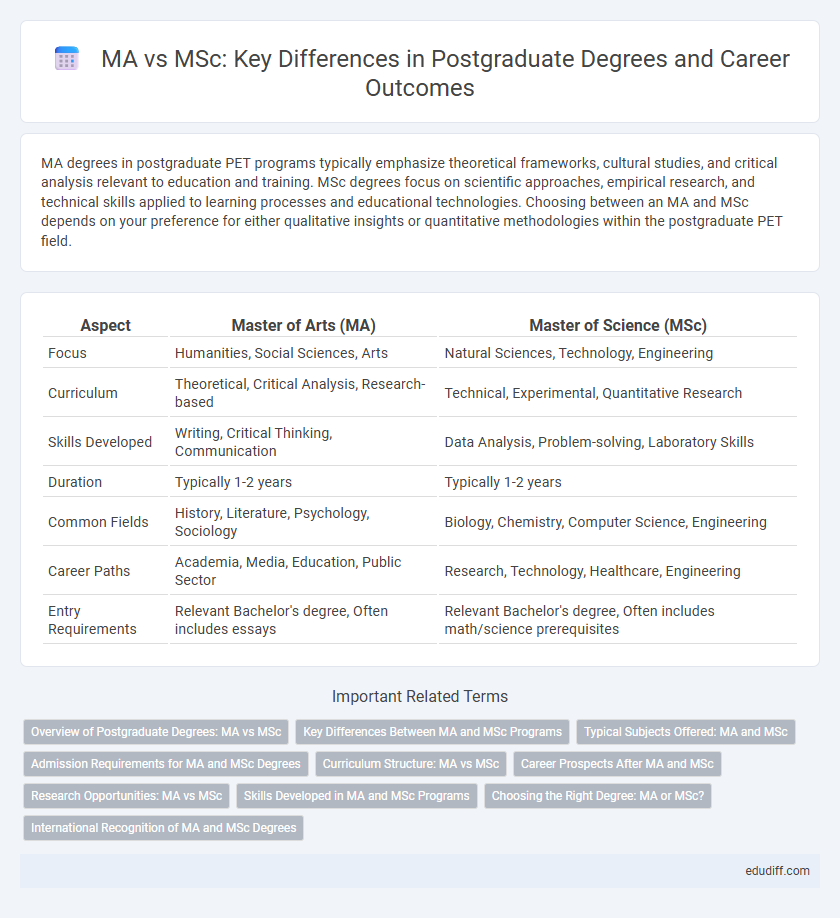MA degrees in postgraduate PET programs typically emphasize theoretical frameworks, cultural studies, and critical analysis relevant to education and training. MSc degrees focus on scientific approaches, empirical research, and technical skills applied to learning processes and educational technologies. Choosing between an MA and MSc depends on your preference for either qualitative insights or quantitative methodologies within the postgraduate PET field.
Table of Comparison
| Aspect | Master of Arts (MA) | Master of Science (MSc) |
|---|---|---|
| Focus | Humanities, Social Sciences, Arts | Natural Sciences, Technology, Engineering |
| Curriculum | Theoretical, Critical Analysis, Research-based | Technical, Experimental, Quantitative Research |
| Skills Developed | Writing, Critical Thinking, Communication | Data Analysis, Problem-solving, Laboratory Skills |
| Duration | Typically 1-2 years | Typically 1-2 years |
| Common Fields | History, Literature, Psychology, Sociology | Biology, Chemistry, Computer Science, Engineering |
| Career Paths | Academia, Media, Education, Public Sector | Research, Technology, Healthcare, Engineering |
| Entry Requirements | Relevant Bachelor's degree, Often includes essays | Relevant Bachelor's degree, Often includes math/science prerequisites |
Overview of Postgraduate Degrees: MA vs MSc
MA (Master of Arts) degrees typically emphasize humanities, social sciences, and creative disciplines, fostering critical thinking and theoretical analysis. MSc (Master of Science) degrees concentrate on scientific, technical, or quantitative fields, prioritizing empirical research and practical application. Both postgraduate degrees enhance specialized knowledge and career prospects but differ in curriculum focus and methodology.
Key Differences Between MA and MSc Programs
MA programs emphasize theoretical knowledge, critical thinking, and qualitative research often in humanities and social sciences, while MSc programs focus on practical skills, quantitative analysis, and scientific methods in fields like engineering and natural sciences. Admission requirements for MSc degrees typically include a strong background in mathematics and technical subjects, whereas MA programs prioritize prior coursework in arts and humanities. Graduation outcomes for MSc graduates frequently lead to careers in research, technology, and applied sciences, contrasting with MA graduates who often pursue professions in education, communication, or cultural sectors.
Typical Subjects Offered: MA and MSc
Typical subjects offered in a Master of Arts (MA) program often include humanities, social sciences, fine arts, and languages, such as history, literature, sociology, and philosophy. Master of Science (MSc) programs typically focus on scientific and technical disciplines including biology, chemistry, engineering, computer science, and mathematics. These distinct focuses reflect the differing academic approaches and skill sets cultivated in MA versus MSc postgraduate studies.
Admission Requirements for MA and MSc Degrees
Admission requirements for MA degrees typically emphasize a strong background in humanities or social sciences, often requiring a relevant bachelor's degree and proof of writing proficiency. MSc programs generally expect applicants to have a solid foundation in scientific or technical disciplines, demonstrated through undergraduate coursework in mathematics, science, or engineering. Both MA and MSc admissions may require letters of recommendation, personal statements, and sometimes standardized test scores depending on the institution.
Curriculum Structure: MA vs MSc
MA programs typically emphasize theoretical frameworks, critical analysis, and qualitative research methods across humanities and social sciences, fostering interdisciplinary perspectives. MSc curricula focus on technical skills, quantitative analysis, and empirical research, often centered on natural sciences, engineering, or technology disciplines. The curriculum structure of an MA usually involves seminars and essays, while MSc programs require laboratories, projects, and statistical coursework.
Career Prospects After MA and MSc
Graduates with an MA often pursue careers in humanities, social sciences, education, and communication, where critical thinking and analytical skills are highly valued. MSc degree holders typically enter technical, scientific, and research-oriented fields such as engineering, IT, healthcare, and finance, benefiting from strong quantitative competencies. Employers in technology, research, and analytics sectors prefer MSc candidates, while cultural institutions, NGOs, and creative industries frequently seek MA graduates.
Research Opportunities: MA vs MSc
MA programs typically emphasize qualitative research methods and theoretical frameworks, fostering critical analysis in humanities and social sciences. MSc degrees prioritize quantitative research and experimental designs, equipping students with robust skills in data analysis and scientific inquiry. Both pathways offer distinct research opportunities tailored to disciplinary approaches and career goals.
Skills Developed in MA and MSc Programs
MA programs cultivate advanced critical thinking, communication, and analytical skills through in-depth qualitative research, enhancing expertise in areas like cultural analysis, language proficiency, and theoretical frameworks. MSc programs emphasize quantitative analysis, technical problem-solving, and empirical research methods, developing competencies in data interpretation, scientific methodologies, and specialized technical tools. Both degrees foster professional skills, but MA programs prioritize interpretative and conceptual abilities while MSc programs focus on practical, data-driven expertise.
Choosing the Right Degree: MA or MSc?
Selecting between an MA and an MSc depends on your academic background and career goals; an MA typically emphasizes qualitative analysis and theoretical frameworks, ideal for subjects like humanities and social sciences, while an MSc focuses on quantitative methods and technical skills, suited for sciences and engineering. Consider the curriculum content and research opportunities, as MSc programs often require a strong foundation in mathematics and scientific methodologies. Evaluating the degree's relevance to your desired profession and sector can enhance career prospects and ensure alignment with industry standards.
International Recognition of MA and MSc Degrees
MA and MSc degrees are widely recognized internationally, with the specific recognition often depending on the field of study and country of interest. MA degrees typically emphasize humanities and social sciences, gaining strong recognition in arts and social research sectors globally. MSc degrees, focused on science, technology, engineering, and mathematics (STEM), tend to have robust recognition in scientific and technical industries worldwide.
MA vs MSc Infographic

 edudiff.com
edudiff.com